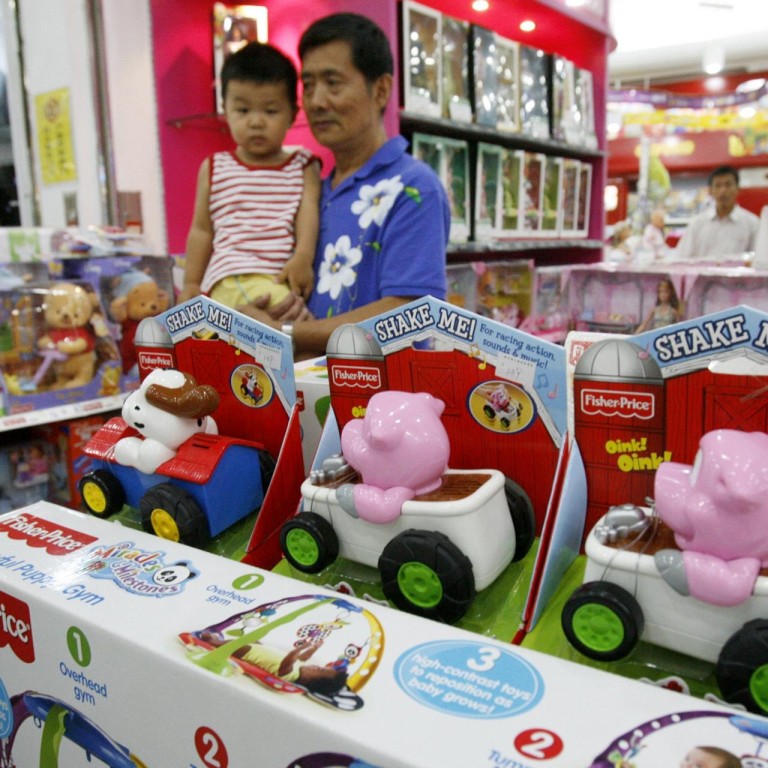
Children seen as growth driver for Chinese shopping malls
Entrepreneurs see golden opportunities as parents want the best quality for their offspring
Mainland Chinese children under the age of 14 outnumber the entire population of Brazil, the world's fifth-largest nation. It is no wonder then that almost all shopping malls on the mainland are generous when it comes to allocating space to children's clothing, toys, education and other activities for young minds.
"[Children] are one of the four pillars of mall demand in China nowadays," said Steven McCord, who leads research into retail trends across China for global property consultancy JLL.
The other three drivers are food and beverages, entertainment and fast fashion. But McCord said the children's sector would soon overtake fast fashion in shopping malls.
Children-related shops have grown fivefold in our malls in the past five years
The logic was that the more attractive a mall was to children, the longer a family would stay there - to dine, shop and be entertained - whereas fast fashion might lose its lustre due to competition from e-commerce, McCord told the .
"Price sensitivity is thrown out the window. You basically have two parents and four grandparents all spending money on the children and there are no limits," he said.
The future opportunity is a multibillion-yuan market offering rich price premiums because most Chinese parents want the best quality when it comes to their offspring, be it food, clothes or education.
If there is any doubt about this, consider that many Chinese families are willing to pay millions of yuan more for a tiny flat to give their children access to the city's best school nearby.
Although the aggregate number of Chinese children under 14 dropped to 225.69 million last year from 265.43 million in 2005, it is still greater than the entire population of any other country in the world except China itself, the United States, India and Indonesia.
Many entrepreneurs see golden opportunities, including mainland billionaire Wang Jianlin, who controls the property-to-cinema conglomerate Dalian Wanda Group. In an address to company staff, Wang said he planned to set up a holding firm later this year to speed up expansion into children-related businesses.
Kids Place, which provides animated content, educational services, parties and restaurants for children under eight and their parents, would open 500 shops across China by 2020, Wang said, up from a previous target of 200. The company will also open its first theme park for older children in Wuhan next month.
Overseas brands targeting children are also accelerating expansion in China as Chinese parents are willing to pay more for foreign products, not just diapers and infant milk powder.
The country will have its first Legoland Discovery Centre next year at the Parkside Plaza in Shanghai. The 126,000 sqmetre family-oriented community mall will feature a number of anchor tenants, including a Tesco supermarket and retailers such as H&M, C&A, Esprit and Mango.
Disney has just opened its global flagship store in Shanghai's Lujiazui financial district, the first of its kind in the country and the biggest in the world. That will be followed next spring by the opening of the US$5.4 billion Shanghai Disney Resort.
Shops selling children's products accounted for 15 per cent of shopping mall space this year, up from 5 per cent in 2011, according to a report by Chinese property consultancy RET, which studied 262 children's brands in the country. These shops covered a total floor space of 9.16 million sqmetres, a surge of 538.8 per cent from four years ago, it said.
In particular, early education was becoming a new growth driver and 63 per cent of children's brands were sourced from abroad, the consultancy added.
That concurs with data provided by Shanghai-headquartered mall operator Powerlong Real Estate Holdings.
"Children-related shops have grown fivefold in our malls in the past five years," president Hoi Wa-fong told the "It sounds crazy. There is no limit."

